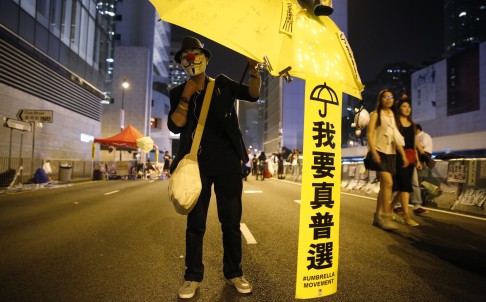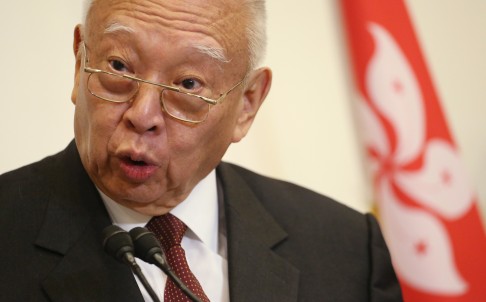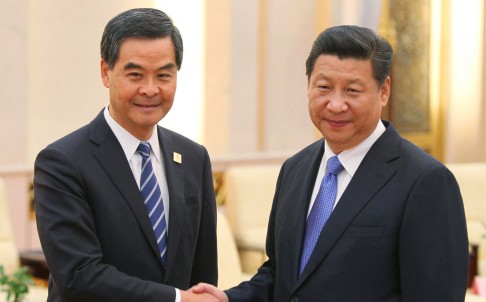Occupy Central
Occupy Central is a civil disobedience movement which began in Hong Kong on September 28, 2014. It calls on thousands of protesters to block roads and paralyse Hong Kong's financial district if the Beijing and Hong Kong governments do not agree to implement universal suffrage for the chief executive election in 2017 and the Legislative Council elections in 2020 according to "international standards." The movement was initiated by Benny Tai Yiu-ting, an associate professor of law at the University of Hong Kong, in January 2013.
OCCUPY CENTRAL - DAY 43: Full coverage of the day’s events
Is self-rule the real aim of Occupy protesters?
Regina Ip says by rejecting the Basic Law, protesters and their supporters are in effect demanding a quasi-independent status for Hong Kong that would cut out Beijing in the election process
PUBLISHED : Sunday, 09 November, 2014, 5:17am
Why do the students and their supporters keep pressing for something that is neither internationally accepted nor consistent with the Basic Law? Photo: AP
For those who are determined that Hong Kong can never become democratic because its motherland is ruled by a communist party, which, by definition, is "a dictatorship of the proletariat", no attempt at democratisation would be meaningful, short of weaning Hong Kong from its motherland.
Student leaders of the Occupy protest, now into the sixth week, and those behind them appear to harbour similar thoughts. Despite declining public support for the protest, student leaders continue to insist on overturning Beijing's decision on the nominating mechanism for the 2017 election and replacing it with "civic nomination", so Hong Kong people can have an unfettered say on who would be their chief executive. To achieve their goal, the latest gimmick is a demand to meet the president in Beijing.
"Civic nomination" is far from being the international norm. Only six countries ranked by the Economist Intelligence Unit as "fully democratic" have "civic nomination" as one way of nominating candidates for high political office. Universal suffrage is, by definition, a universal and equal right to vote in genuine periodic elections by secret ballot. Our system of elections to district councils and the Legislative Council are entirely consistent with international norms.
The International Covenant on Civil and Political Rights forbids "unreasonable restrictions" on the exercise of political rights, but it is hard to equate these safeguards as mandating a universal right to nominate or to participate as a candidate.
So why do the students and their supporters keep pressing for something neither internationally accepted nor consistent with the Basic Law? Are they truly seeking democracy or a quasi-independent status that cuts Beijing out of the selection of the chief executive? Despite the Western media's initial branding of the protest as an "umbrella revolution", local advocates have taken care to drop the "R" word. But in their hearts, hiding behind banners broadcasting the "D" word from the Lion Rock, are they actually seeking self-rule? Failing that, as much damage to the Leung Chun-ying administration and relationship between Beijing and Hong Kong as possible?
If, by democratic development, the students have in mind popular participation, it is already at its highest point in our history. From the time functional constituency elections were created in 1985, popular participation in pubic affairs has grown by leaps and bounds. From 2016, all district councillors will be elected. Forty of 70 legislators are directly elected. Among those elected in functional constituencies, nine are elected by qualified individuals in their professions in highly competitive elections.
Periodic elections to these representative bodies which play important roles in managing our city have greatly increased the transparency of government operations and the accountability of officials. Yet our semi-democratic system is plagued by the same perils as those which beset mature democracies. Prolonged and inconclusive consultations have taken a toll on civil service morale and efficiency. When politics trumped public interest, filibustering by a radicalised minority in the legislature brought the government close to a US-style fiscal cliff. With legislators threatening "political non-cooperation" in vetting bills and government expenditure proposals unless Beijing gives Hong Kong "true democracy", more delays and gridlock are in the pipeline.
Eminent scholars have suggested that the only way to overcome the social divide is to ensure the next chief is elected with a convincing popular mandate. If the American example of a popularly elected president crippled by a hostile Congress is anything to go by, such a belief is likely to be wishful thinking.
A strong popular mandate would bring many benefits to governance. But, once in power, an elected chief risks losing popularity if he or she makes tough choices on controversial issues. Moreover, even a popularly elected leader needs the support of a strong team and the ability to work with the legislature.
No system is perfect. If what the students and their supporters actually want is to cut off China, that mission is doomed to fail. Any sane person knows Hong Kong relies heavily on China for basic necessities and cannot survive without its support. Hong Kong people have nothing to gain from an unravelling of the Basic Law, which guarantees our separate systems under one country.
It is entirely possible to build a democratic system within the framework of the Basic Law. Young people could seek places on the nominating committee in the next stage of consultation. So could women and other under-represented groups. With more competition, we would have a greater chance to elect a more representative and capable chief.
Those in the pan-democrat camp would dismiss such piecemeal improvements as insufficient to guarantee majority support by the nominating committee. But why should any candidate, of whatever political hue, seek such a guarantee long before the chief executive election campaign begins? Aren't candidates supposed to work hard to win a seat, and, through the campaign process, win hearts and minds? Rejectionism and sloth are no substitutes for integrity, competence and hard work.
Regina Ip Lau Suk-yee is a legislator and chair of the New People's Party
This article appeared in the South China Morning Post print edition as Is self-rule the real aim?
'There is no point in talks with Beijing', ex-Hong Kong chief executive Tung Chee-hwa tells students
Former chief executive sidesteps request by students that he help arrange meeting with state leaders, saying their stance won't change
PUBLISHED : Sunday, 09 November, 2014, 6:10am
Former chief executive Tung Chee-hwa says Beijing will not change the political reform framework for Hong Kong. Photo: Felix Wong
Former chief executive Tung Chee-hwa has sidestepped a request by student organisers of the Occupy movement to meet state leaders, saying Beijing will not change the political reform framework for Hong Kong.
Tung's response came a day after a member of student activist group Scholarism on a personal trip to Shenzhen was denied entry to the mainland because he had taken part in activities that "violate national security".
Tung, a vice-chairman of the Chinese People's Political Consultative Conference, had read an open letter delivered to him by the Federation of Students on Friday, asking him to arrange the meeting, his spokesman said.
"[Tung] thinks they are just repeating their views and stance in the letter, which won't help to break the impasse," the spokesman said. "Mr Tung points out that the central government understands the different views in Hong Kong. The decision of the National People's Congress Standing Committee on August 31 will not change."
Chief Executive Leung Chun-ying said Beijing officials had met pan-democratic lawmakers several times, and the students' demand for public nomination of candidates for 2017 had already been put across. Leung emphasised his own role in setting up a Shanghai trip for lawmakers to meet the officials in April.
The August decision laid down the framework for the city to elect its leader by "one person, one vote" for the first time in 2017. An election committee will have exclusive power to nominate candidates for the race.
Tung urged students to end the protests and go back to their studies.
In a statement, the Federation said Tung had not said yes or no to their request, and it urged him to give a clear answer. It added: "Simply asking people to retreat from protest sites will not solve the political dispute."
The student who was stopped at the border on Friday was under 18 and was not a core member of Scholarism, its convenor, Joshua Wong Chi-fung, said on a radio show yesterday.
He said the group's website had been targeted in cyberattacks and wondered if mainland authorities had a blacklist of Scholarism members.
Wong said the student had gone to Shenzhen on a personal trip with his family, but when he got to the mainland side of the border, he was taken to a room and questioned. The teenager was later released.
In an editorial yesterday, The Washington Post said although it was unlikely that the students would be allowed near Beijing, President Barack Obama "ought to take a cue" and "he can make clear that the United States supports their call for genuinely free elections".
Meanwhile, the Civil Human Rights Front's appeal against a police decision not to open a driveway outside the central government's liaison office in Sheung Wan for protesters to assemble was dismissed.
The front planned to lead a pro-democracy march to the office today. The Appeal Board on Public Meetings and Processions said if the police were unable to control the marchers it could affect liaison office operations.
This article appeared in the South China Morning Post print edition as Tung sees 'no point' to talks in Beijing
Xi Jinping pledges support for Hong Kong's efforts to safeguard rule of law
At their first meeting since start of the Occupy protests, president tells C.Y. Leung democratic reform must be done within terms of Basic Law
PUBLISHED : Sunday, 09 November, 2014, 2:08pm
C.Y. Leung is greeted by Xi Jinping in Beijing. Photo: Simon Song
The central government will "resolutely support" the Hong Kong government's efforts to safeguard the city's rule of law which is the cornerstone of its future, President Xi Jinping told visiting Chief Executive Leung Chun-ying at their first meeting since the Occupy protests began.
Xi said China was committed to the city's democratic reform but stressed it must be done within the framework of the Basic Law - the city's mini-constitution.
He reiterated the need for Hong Kong people "to fully and accurately" understand the "one country, two systems" principle.
"The rule of law is a key foundation for Hong Kong's long-term stability and prosperity … The central government will stay committed to the 'one country, two systems' principle and the Basic Law. We will firmly support Hong Kong to develop democracy in line with law and its endeavour to maintain its long-term stability," Xi said.
Xi called on "all sectors in Hong Kong, under the leadership of Leung and the SAR government", to "seize the historic opportunity to realise universal suffrage according to [the Basic] Law", Xinhua reported.
Leung also said the central government would "soon" announce a through-train scheme to allow cross-trading of stocks in Hong Kong and Shanghai.
"Rule of law" is Xi's latest catchphrase and the central theme of the latest policy blueprint endorsed by the Communist Party. Xi reportedly told Leung that the blueprint mentioned the importance of safeguarding "one country, two systems".
A source close to the Hong Kong government said Xi cited a line from an ancient poem - "strong winds reveal the strength of sturdy grass" - as praise for Leung's loyalty and resilience in handling the Occupy protests and Beijing's firmest support yet for the chief executive.
The poem, said to be written by Emperor Taizong during the Tang dynasty, was often cited by emperors to praise loyal ministers in times of adversity. The line is followed by "turmoils test the loyalty of a good minister".
Leung said he told Xi that the Occupy protests had seriously disrupted the city's social order and shaken its rule of law, but that the Hong Kong government could handle the protests by itself and in accordance with the law.
Xi offered full support for Leung's efforts to maintain "social order".
The chief executive later said that Xi had expressed approval of his administration's recent performance, although Xi did not make such a reference in the opening remarks of the meeting, which was open to media.
Leung did not give an exact date for the through train but said the president "responded positively" to his request to start the scheme as early as possible.
The scheme would allow investors to conduct cross-border share trading up to a quota of 550 billion yuan (HK$700 billion). Leung said rule of law and social order were important conditions for implementing the scheme.
China watcher Johnny Lau Yui-siu said Beijing's attempt to link implementation of the through-train scheme with the city's social order would exert more pressure on Occupy protesters and strengthen public opposition to the movement.
Lau also believed Xi had implied that the political reform framework set by the National People's Congress could not be changed.
"The decision made by the Standing Committee of the National People's Congress is also law. Beijing's stance is clear - the blueprint is inalterable," he said.
The Federation of Students disagreed with Leung's claims and said it was his administration that was undermining the rule of law and social order.
Secretary general Alex Chow Yong-kang said: "Hongkongers understand these are little tricks by … Leung Chun-ying. He is not focusing on the most immediate issues and is instead diverting attention to other topics."
This article appeared in the South China Morning Post print edition as Xi pledges support for city's rule of law




沒有留言:
張貼留言